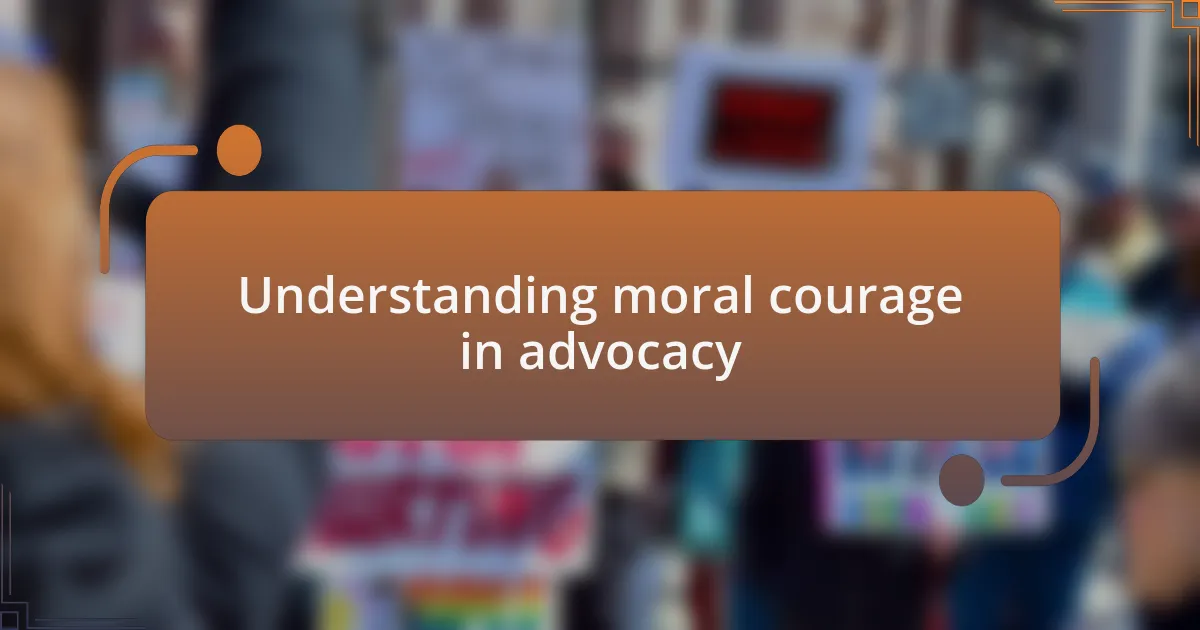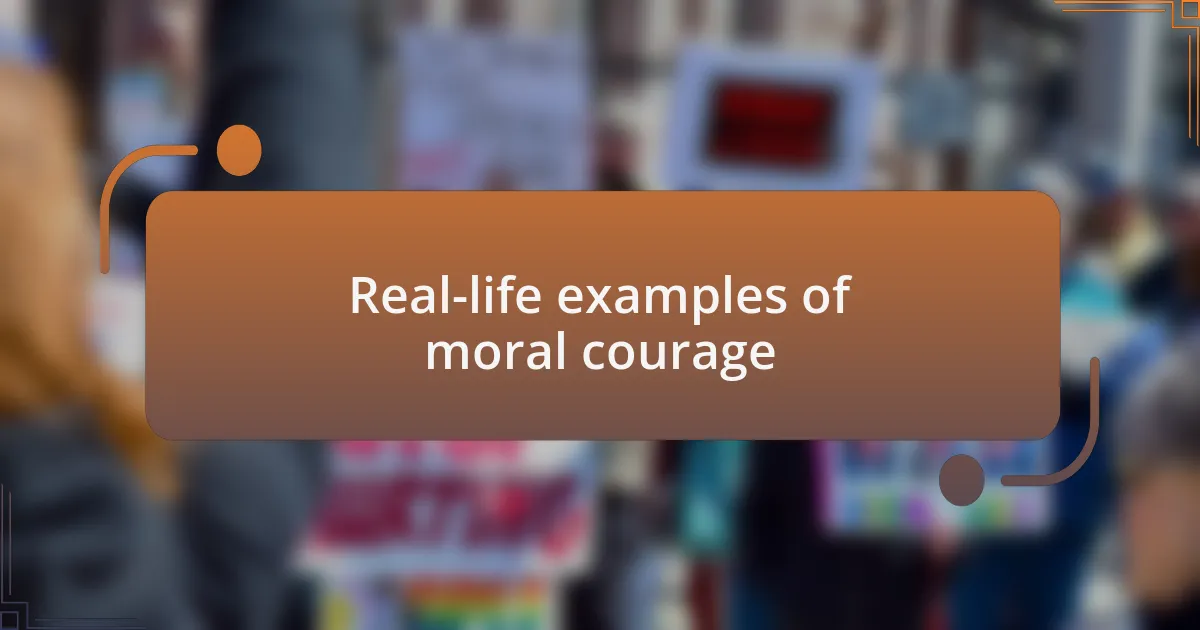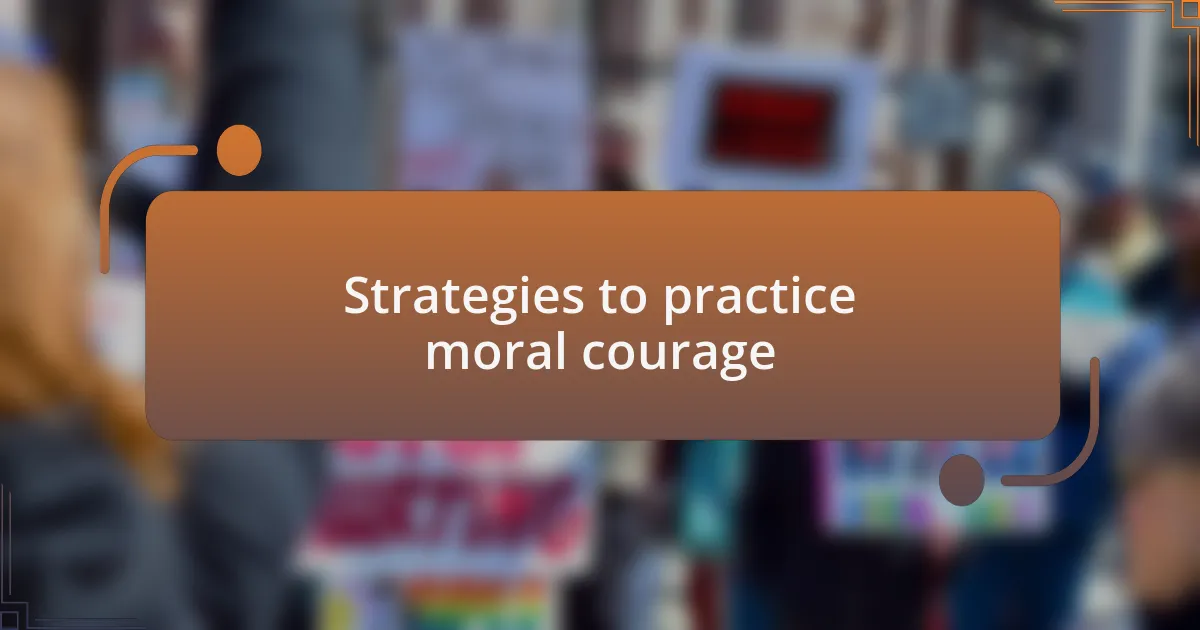Key takeaways:
- Moral courage in advocacy involves standing firm in one’s beliefs and acting in alignment with those convictions, even in the face of opposition.
- Real-life examples, such as Abby Johnson and Sarah, illustrate how personal experiences can drive individuals to advocate courageously for their beliefs.
- Strategies to cultivate moral courage include self-awareness, building a support network, and practicing small acts of courage in everyday situations.

Understanding moral courage in advocacy
Moral courage in advocacy is about standing firm in one’s beliefs, even when faced with overwhelming opposition. I vividly remember a time when I spoke at a community meeting about the importance of pro-life values. The tension in the room was palpable, but I felt an inner strength that propelled me to share my perspective, knowing that honesty was crucial for fostering understanding.
This kind of courage isn’t just about speaking out; it also involves the willingness to act in line with one’s convictions. Have you ever felt that tug in your heart when witnessing an injustice? That feeling can serve as a powerful motivator, pushing us to engage in dialogue and take actions that may be uncomfortable but necessary. I often find myself reflecting on how my choices impact those around me and the broader community, driving my passion for advocacy.
Moreover, moral courage requires us to embrace vulnerability. When I share my story or why I advocate for life, I often lay bare my fears and hopes. This openness can resonate with others, creating a space for deeper conversations. Isn’t it incredible how vulnerability can forge connections? Ultimately, it’s about cultivating trust and understanding in a world that sometimes feels divided.

Real-life examples of moral courage
Standing up for pro-life convictions often means facing pushback, but I think of people like Abby Johnson, who once worked for Planned Parenthood and then made the brave decision to switch sides. Her story resonates deeply with me because it illustrates an incredible transformation fueled by moral courage. When she chose to speak out against the organization, she risked her career and personal relationships in a bold stand for what she believed—imagine the weight of that choice.
Another poignant example comes to mind with a friend of mine, Sarah, who spoke at her university about her experiences with pregnancy help centers. Despite facing hostility from fellow students, she passionately shared how those centers empower women facing unexpected pregnancies. I still remember her shaking voice, filled with conviction, and the moment she paused to take a breath before addressing the crowd again. It was a testament to how personal experiences could ignite moral courage, even in the most challenging environments.
Then, we cannot overlook those individuals who quietly advocate for life in their daily choices, like my neighbor who volunteers at a local crisis pregnancy center. Every week, she dedicates her time to counseling and supporting young mothers, often at the expense of her own time. Watching her kindness and commitment makes me wonder: what ripple effects can one person’s moral courage have in their community? She embodies the idea that every small act of courage contributes to a larger narrative of advocacy, reminding us all that we can be change-makers, one interaction at a time.

Strategies to practice moral courage
To cultivate moral courage, I believe it’s essential to start with self-awareness. Reflecting on my own values and understanding why they matter deeply helps solidify my commitment. I often ask myself, “What am I willing to stand up for, even when it’s unpopular?” This kind of introspection lays the groundwork for the courage to act.
Another strategy that has worked for me is finding a support network. I joined a group of like-minded individuals who share my pro-life beliefs. In moments of doubt or fear, having those allies boosts my confidence and reminds me that I’m not alone. It’s amazing how a simple conversation or shared experience can reinvigorate my resolve to speak up for what I believe is right.
Additionally, practicing small acts of courage in everyday situations builds resilience. For instance, I remember a time when I politely challenged a friend’s dismissive comments about pro-life issues during a casual conversation. It felt uncomfortable at first, but each small act reinforced my belief in speaking out. I often consider how these little moments accumulate, making a significant impact over time. Isn’t it fascinating how each encounter shapes our ability to face larger challenges?